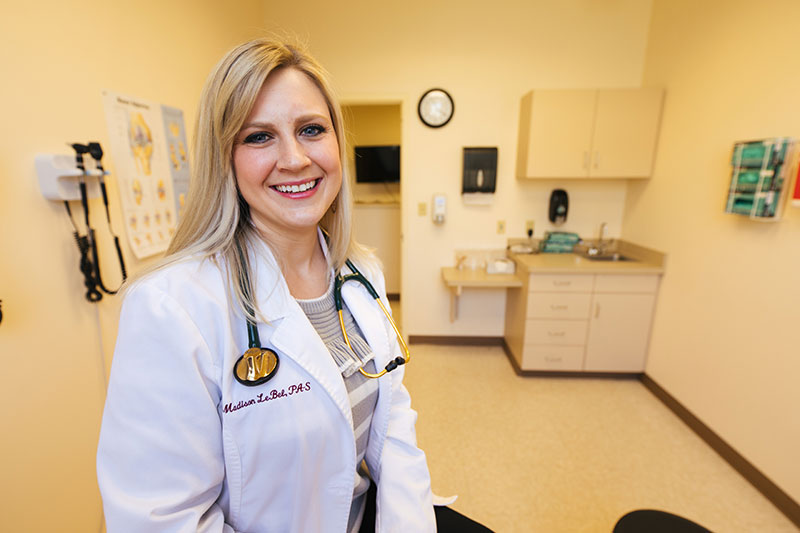Prerequisite Courses

Please view your intended admission pathway for the required prerequisites.
General Prerequisite Requirements (all pathways):
- Prerequisite courses must be taken from a regionally accredited college or university; the program does not accept prerequisites from non-regionally accredited institutions such as Portage Learning, StraighterLine, or Sophia Online Learning.
- If a prerequisite course(s) is in progress or not yet completed at the time of application, an applicant can still be considered for a seat in the program as long as a written plan to finish all required prerequisites is established.
- Applicants selected for an interview will be notified if the program determines a course does not meet prerequisite requirements.
- Applicants must complete all prerequisite courses as outlined in their admission pathway prior to matriculation.
- An applicant’s seat will be automatically rescinded if all required prerequisites are not completed prior to the date of matriculation.
Prerequisite Requirements:
The Traditional Admission Pathway is for applicants who have been awarded a bachelor’s degree (or higher) from a regionally accredited college or university. If a bachelor’s degree is in progress at the time of application, a feasible plan to obtain the degree before matriculation must be in place.
| Required Prerequisite Courses | Description A letter grade of a “C” or better is required for all Traditional Admission applicants. | Length |
|---|---|---|
| Human Anatomy* | Must be a "Human” natural science major course. Comparative, vertebrate, introductory, and non-science major courses will not be accepted. Must be completed within 10 years prior to matriculation. Lab required. *Human A&P I with a lab for natural science majors can satisfy this requirement. | 1 semester (4-credit minimum, includes lab) |
| Human Physiology* | Must be a "Human” natural science major course. Comparative, vertebrate, introductory, and non-science major courses will not be accepted. Must be completed within 10 years prior to matriculation. Lab required. *Human A&P II with a lab for natural science majors can satisfy this requirement. | 1 semester (4-credit minimum, includes lab) |
| General Biology | A General Biology course with a lab for natural science majors. Introductory courses and courses for non-science majors will not be accepted. A lab is required. | 1 semester (4-credit minimum, includes lab) |
| Microbiology | A General or Medical Microbiology course for natural science majors. Introductory and non-science major courses will not be accepted. Lab recommended. | 1 semester (3-credit minimum, lab not required but strongly recommended) |
| Chemistry | Two General Chemistry courses for natural science majors. Upper-level Chemistries and Biochemistry will be accepted. Introductory and non-science major courses will not be accepted. Lab required. | 2 semesters (8-credit minimum, includes lab) |
| Organic Chemistry I | Organic Chemistry I for natural science majors. Introductory and non-science major courses will not be accepted. Organic Chemistry II and the lab will not fill this requirement. Lab required. | 1 semester (4-credit minimum, includes lab) |
| Statistics | Any statistics course directed towards an understanding of foundational statistics. | 1 semester (3-credit minimum) |
| Psychology | Introductory, developmental, and abnormal psychology courses are accepted. | 1 semester (3-credit minimum) |
| Medical Terminology | While not required, a 1-3 credit course is strongly recommended. Admitted applicants will be required to take a medical terminology proficiency exam the first week of classes. | |
| Biochemistry | While not required, at least one semester with a lab is strongly recommended. | |
| Calculus | While not required, at least one semester is strongly recommended. |
Note: The UC PA Program may consider additional courses to satisfy prerequisite requirements on a case-by-case basis and may request additional documentation.
Fast Track Admissions is for enrolled full-time UC undergraduate students with less than 30 credit hours from other institutions.
| Course Name | UC Course Number | Minimum Grade Requirement |
|---|---|---|
| Human Anatomy & Physiology I with lab | BIOL 251/251L | A |
| Human Anatomy & Physiology II with lab | BIOL 252/252L | A |
| General Biology with lab | BIOL 130/130L | B |
| Microbiology with lab | BIOL 331/331L | B |
| General Chemistry I with lab | CHEM 101/101L | B |
| General Chemistry II with lab | CHEM 102/102L | B |
| Organic Chemistry I with lab | CHEM 201/201L | B |
| Organic Chemistry II with lab | CHEM 202/202L | B |
| Statistics | NSCI 220 | B |
| Psychology | PSYC 101 or PSYC 212 | B |
| Medical Terminology | BIOL 303 | B |
| Calculus | Math 201 | B |
| Biochemistry with lab | BIOL 230/230L | While not required, this course and lab are strongly recommended. |
The Transfer Admission Pathway is for applicants who are currently or recently enrolled (within the past two CASPA application cycles) in an accredited PA program. Transfer applicants must be in good academic standing per their official transcript and must not have been dismissed from their PA program for academic and/or professional reasons per a letter of support from their prior program. Applicants whose programs are shutting down may apply through this pathway.
Transfer applicants need to meet one of the two options below to satisfy prerequisite requirements.
- Option 1: Meet all UC PA Program Traditional Admission Pathway prerequisite requirements.
- Option 2: Email evidence of meeting the prior program’s prerequisite requirements to paprogram@ucwv.edu.
The Admissions Coordinator will contact the applicant to request additional information, as needed.
You can find answers to frequently asked questions in the Frequently Asked Questions section.
